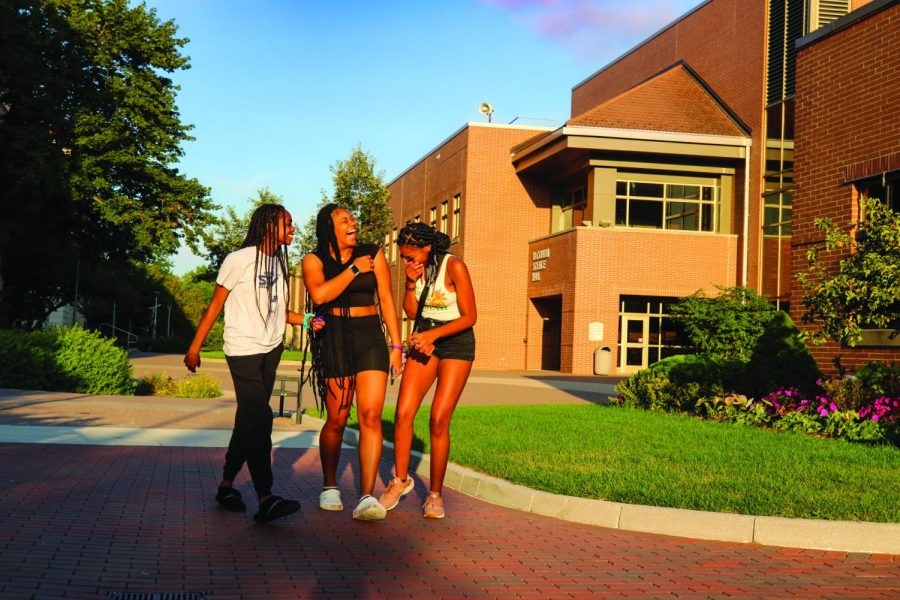UNI and Faculty Senate working to update “peer institution” list
Shifting enrollment numbers, demographics and priorities are all reasons for universities to update peer institution lists. UNI Faculty Senate has proposed updates to the peer institution list, which will be the first review of it since 2014.
Feb 8, 2023
At the last UNI Faculty Senate meeting on Jan. 23, 2023, a proposal was discussed to update UNI’s list of peer institutions. The purpose of UNI having peer institutions is so the university can have similar colleges to compare and contrast itself against in critical benchmarks. These benchmarks include enrollment growth and decline, as well as overall educational goals for the institution.
The University of Northern Iowa currently has ten peer institutions. They include the
College of Charleston, Eastern Illinois University, Ferris State University of Michigan, James
Madison University of Virginia, Marshall University, Southern Illinois- Edwardsville, Truman
State University, U-Mass Dartmouth, U-Minnesota Duluth and Western Washington State.
These colleges were selected as peer institutions in 2014 due to their strong similarities to the University of Northern Iowa, as they are all comprehensive regional universities. Nevertheless, as times changed, so did these universities’ similarities to UNI, so in reaction, the University of Northern Iowa’s faculty senate has proposed to update the list.
Changes to be included on the new list include keeping the University of Minnesota
Duluth, College of Charleston, Eastern Illinois, and Western Washington State University.
Concurrently, the College of New Jersey, Central Connecticut State University, Minnesota State-Mankato, University of Wisconsin Whitewater, the University of Wisconsin Eau Claire and Indiana State University will be added.
Universities removed from the new list include Truman State University of Missouri,
Ferris State, Marshall, SIU-Edwardsville, U-Mass Dartmouth and James Madison.
Kristin Moser of UNI’s Institutional Effectiveness & Planning office said it was time to change the list. Moser stated, “It is best practice to review an institutional peer list on a regular basis. The last time this review happened was in 2014. During this intermediate period, university characteristics changed based on institutional priorities, demographic shifts, enrollment changes, etc. An institution that was a peer to UNI 10 years ago may have changed to the point that we no longer have as many similarities as differences.”
Moser gave an example regarding the drop of Missouri’s Truman State University from the original list to the new one, “For example, Truman State University was on our peer list.
However, their enrollment has declined over the past 10 years, and they no longer are the best peer for us.”
The six new peer institutions proposed to join the list were chosen for several reasons.
Regarding the reasons, Moser stated, “The current set of peers was selected in 2014 using a collaborative, data-informed process involving various campus stakeholders. The 2023 list of institutions was chosen using the same methodology as in 2014, taking into consideration a variety of high-level institutional characteristics (e.g., institution size and types of degrees offered) as well as specific variables like tuition, in-state vs. out-of-state enrollment, student financial need, number of full-time faculty and total operating budget.”
Stability has been the key to limiting changes to their peer lists at the other two regent
universities, Iowa and Iowa State. Iowa State updated its list in 2016, while the University of
Iowa has kept theirs the same since its creation in the mid-1980s. This lack of change is due to Iowa State and Iowa’s relatively stable enrollment over time. On the other hand, the University of Northern Iowa is ready for a change due to its presently changing environment. UNI’s enrollment has dropped over the last few years, and it no longer looks like some of the colleges from the 2014 list.
Like any other American university, UNI is always striving to be better and more
appealing to potential students. Having a peer institution list streamlines the process of finding other institutions like UNI to compare critical programs and their viability. Moser says her office uses institutional peer lists, too, “We use our peer list to benchmark various metrics used to track continuous improvement efforts on campus. For example, it can show us how UNI performs on indicators such as student retention and graduation rates compared to similar universities.”
The UNI Faculty Senate and the office of UNI Institutional Effectiveness & Planning hope that the Iowa Board of Regents will approve this change at their February 2023 meeting.
The University of Northern Iowa faculty senate will hold its next meeting via zoom on Feb. 27, 2023.









